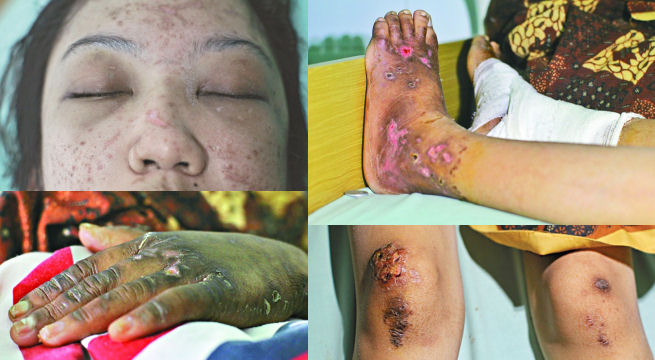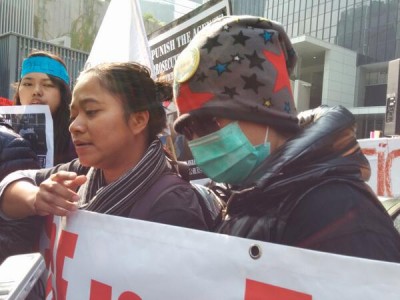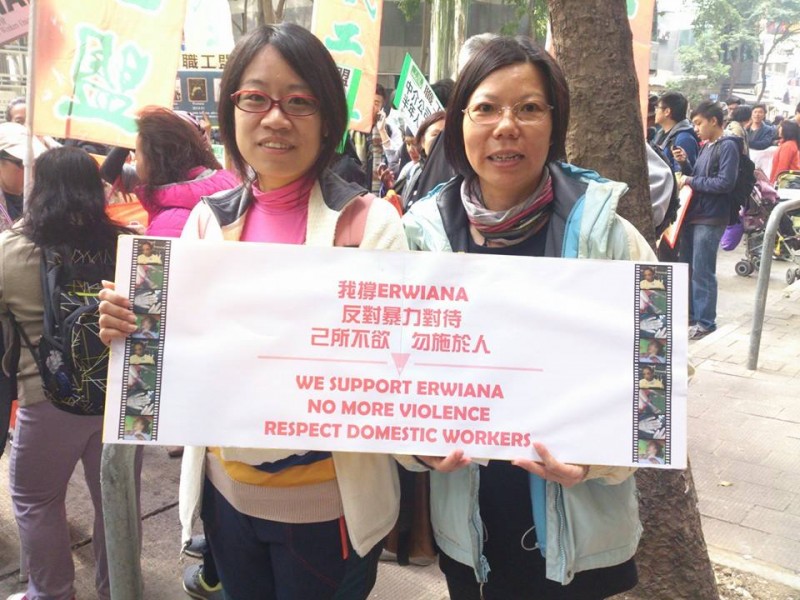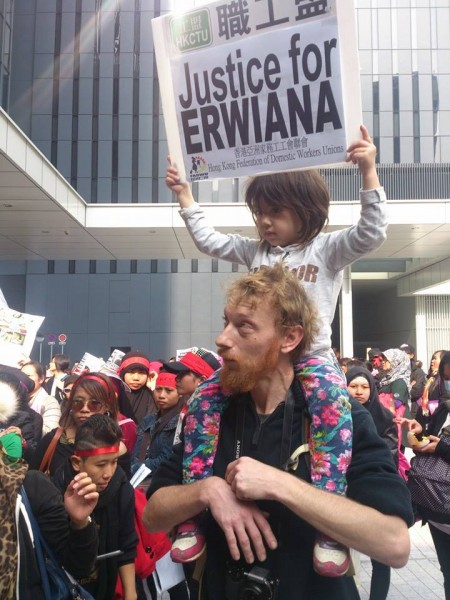
Thousands rallied on January 19, 2014 demanding justice for Erwiana Sulistyaningsih, an Indonesian maid who was allegedly tortured by her employer. Photo from Hong Wong.
[The author of this post is a volunteer editor for news site inmediahk.net, which is quoted in this report.]
Another damning case of foreign maid abuse has recently been exposed in Hong Kong. Thousands of Indonesian domestic workers and local residents in the city on January 19, 2014 demanding justice for Erwiana Sulistyaningsih, a domestic worker who was allegedly abused by her employer for months.
The 23-year-old maid arrived in Hong Kong in May 2013 and started working for a family in Tsueng Kwan O, where she says was beaten with sticks and hangers on a daily basis for 8 months for “poor performance” at her job. As a result of the compulsory live-in arrangement, she could not reach out to her fellow maids for help. She could not even escape because her passport was held up by the maid agency, which she says only cared about getting back their service fee from the maid's monthly salary and ignored her desperate call for help.
Local media reported that she was found “covered in cuts and burns” in the Hong Kong Airport on January 10, 2014 and was hospitalized immediately after she arrived back home in Java, Indonesia. Apart from obvious cuts, the initial medical report found small bone fractures in her head. In fact, she was let go by her employer because she could barely walk due to the injuries.

Erwiana Sulistyaningsih was found in the Hong Kong airport on January 10, 2014 with obvious physical injuries on her body. Photo from Apple Daily News, non-commercial use.
Back home in the hospital, Sulistyaningsih told the media that “she was beaten daily, burned and allowed only two meals of plain bread and rice per day. She was allowed to sleep only between 1 p.m.-5 p.m. but not at night”. In fact, she's not the first maid from this family who has claimed they were abusive; at least two other maids who worked for the same employer have said that they had similar experience.
Activist groups are working together to press for policy solution to end the city's modern-day slave system. Auyang Lunfa from inmediahk.net, a local citizen media site, reported from the rally one of the maid's testimony:

Foreign maid Susie alleged at the rally that she was also starved and abused by the same employer between 2011 to 2012. Photo from Tom Grundy's Twitter.
印傭 Susi 稱,自己在2010年4 月開始為涉案僱主工作至2011年3月,期間11個月,除了被禁足不準出門,而且每天被要求工作20小時,同時亦受到不同程度的虐打。她指「每當做錯野時就會被打」,曾被僱主曾用雞毛掃打,亦試過被猛耳仔。最嚴重一次,僱主曾威脅 Susi 叫她自殺。結果 Susi 苦苦哀求對方說:「自己有一對子女, 唔好要我死。」Susi 又指,中介公司無按合約每月3580付人工,反而在 Susi 終止合約時,只付上約六千元,作為11個月人工。Susi 表示已經到警署提供資料。
Indonesian maid Susi said she was working for the same employer between April 2010 to March 2011. For 11 months, she was forbidden to leave the apartment and was required to work 20 hours a day. She was beaten as well. “Whenever I did something wrong, I would be beaten”, she said. Her former employer would beat her with sticks and twisted her ears, once Law even threatened Susi and asked Susi to kill herself. Susi had to beg her, saying: “I have two kids, don't ask me to die.” Susie says the agency did not pay her the 3,580 Hong Kong dollars [approximately 480 US dollars] monthly salary. She was only given 6,000 Hong Kong dollar [approximately 880 US dollars] by the end of her 11 months of work. Susi had reported her case to the police [after Sulistyaningsih's case was exposed].
外傭組織發言人 Eni Lestari 透露,有另一名叫 Tina 的印傭於2011年間,為涉案僱主短暫工作三個月。Eni 說,Tina 要每日超時工作和沒有足夠食物,並同樣受到虐打。最後 Tina 在朋友幫助下報警,最後成功離職,現身在新加坡。
Eni Lestari, a foreign migrant worker campaigner, revealed that another Indonesian domestic worker named Tina had worked for the Law family for three months in 2011. Tina was also starved, worked overtime and was beaten. She reported the case to the police with her friends’ help and managed to resign from the job. Now Tina is working in Singapore.
Tina's case was never investigated, according to local media's report. The Hong Kong police said that they did not have enough evidence. When Sulistyaningsih's case was exposed by local media, Hong Kong police filed it under “miscellaneous case” because they did not have enough evidence to warrant taking further action.

Local women rallied on January 19, 2014 to show their support for Erwiana Sulistyaningsih. Photo from Facebook campaign page Justice for Erwiana! Justice for Migrant Domestic Workers!
Over the past week, migrant organizations and local activist groups, including Mission for Migrant Workers, Amnesty International (Hong Kong), Open Door, Women Worker Association and Hong Kong Coalition of Trade Unions has been campaigning for justice for Sulistyaningsih. The weekend protest attempted reveal the Hong Kong police's long-time negligence of domestic workers’ calls for help as well as other discriminatory and exploitative policies, including the mandatory live-in requirement and the fortnight regulation on their visa, as well as the lack of minimum wage and working hour protection. Similar discussion happened a few months before when the story of Kartika Puspitasari's abuse came to light.

An infographic explaining the exploitative policy concerning foreign domestic workers. Image from Facebook campaign page Justice for Erwiana! Justice for Migrant Domestic Workers!
It is obvious that the Hong Kong government has to bear responsibility for the vulnerable situation of the foreign domestic helpers in Hong Kong. Post 852, a newly established commentary platform, explained the unbalanced power relationship between the employer and maid and made a suggestion:
與大部份香港人不同,外傭在港其實是「叫天不應,叫地不聞」,處境特別危險。[…]外傭在香港根本「冇人冇物」,親友都在遠方的鄉下。所以,一旦受虐,根本不會有人知曉。事實上,即使外傭在港認識了其他同鄉,對方也未必知道自己的住址,只要僱主突然沒收其手提電話,外傭就會立刻與世隔絕。
Different from local residents, foreign domestic workers are isolated from the society and thus in a vulnerable position. […] foreign maids have very frew friends and their family members are not in Hong Kong. No one knows that she is being abused. Even if foreign maids get to know some of their peers in Hong Kong, they don't have each others’ addresses. When the employer confiscates their mobile phone, she would be cut off from the rest of the world.

Many kids joined the rally to support their nannies. Image from Facebook campaign page Justice for Erwiana!
每間公司也會有「售後服務」,例如其公司就會免費為首次來港工作的印傭,提供最多兩次的家訪服務。不過,家訪的出發點並非為了確保印傭安全,而是幫忙解決僱傭雙方的語言障礙或合作問題(其實服務對象是以僱主為主)。更何況,假如僱主簽約時表明不需家訪服務,則公司也不會強求。
[In principle] every agency should provide services such as paying home visits to the maid. However, such visits are not set to ensure the safety of the maids, but to solve communication problems between the employers and the maids (the main purpose is to serve the employers). If the employers choose “no home visits” when they sign the contract, home visits is not mandatory.
其實,政府可立法強制中介公司定期家訪外傭,假如公司不遵守或敷衍了事,可被政府除牌。進一步說,政府更可直接由自己成立「外傭安全小組」作定期抽樣家訪,或要求外傭定期要到政府的辦事處面見職員。
Actually the government can make it mandatory for the agencies to pay home visits to the maid or they cannot obtain the licenses. Or the government can even set up its own team to randomly pay home visits to the maids or require the maids to have a private interview with the officers.
As a result of the pressure from migrant organizations and the Indonesian consulate, Hong Kong police and labor department finally sent an investigative team to Indonesia on January 20 to obtain testimony from Sulistyaningsih, as well as her medical reports from the hospital.







3 comments